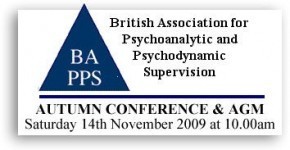How Much is Enough? Endings in Psychotherapy and Counselling
By Lesley Murdin
(2000. London: Routledge)
Reviewed by Eleanor Creed-Miles
I often wonder if our work (in both supervision and practice) is not so much a superior position that we adopt and process of our own supported by theory – as supervising and practicing alongside what our clients (supervisees) believe they are asking us to do. Thus a sort of mutual muddling along based on equality of expectation and assumption about the process. Endings in this ‘impossible profession’ are therefore (we hope) effective and mutual, based on what both parties assumed to be the case. Most psychoanalytic models suggest that the optimum desired outcome is the patient/client/supervisee deciding what is enough and then effecting the ending with the therapist or supervisor rather than a mutual process and Lesley Murdin sensitively and mindfully explores this with warmth and respect for her clients and patients and good humour throughout.
However, the introduction focuses on problematic ending rather than mutual review and conclusion, which I felt might be because we turn to theory when the going has already got tough and something is unresolved, difficult or feels ‘bad’ about the way our work is going – we are looking for support in this delicate time. This Lesley Murdin carefully explores when looking at how we as therapists and supervisors are affected “ Ending is inherently painful if it is fully experienced, but it can bring strength and contentment when it is actually achieved” (page 21). Chapter five – The Therapist Ends – is tremendously detailed and helpful with this, as are the final three chapters.
In teaching I have recommended this book very highly as it boldly goes where no book has gone before and addresses issues that are otherwise distressing and difficult to approach – reflecting how impossible it is to really talk about (or work around) death and dying. Endings are redolent with past losses and this is carefully detailed in the book. Indeed, chapter four is titled ‘Staying Alive’ and most of the examples are in the context of a future for both the therapist and the client, even if that is a separate one.
Chapter three regarding illusions and narcissism around ending is the real jewel in the crown for me. It details both how our own unresolved primary narcissistic issues may obstruct our ability to end well – either in our professional practice or indeed in our personal lives. Rather than taking a purely psychodynamic approach here, Lesley Murdin carefully (and again with great warmth) explores the existential and ontological diaspora. In delving into the deepest of wounds and narcissistic affect she opens up the possibility of question and challenge to ourselves.
The patient’s unilateral ending (chapter four) is detailed and explores acting out with thorough examples and vignettes. This chapter was the most technical and generic for me, though extremely detailed and helpful.
For BAPPS membership and readership Lesley Murdin’s final chapter on Endings in Training and Supervision is most relevant and offers technique and speculation around implications and issues in equal measure.
This magnificent book never shirks the painful and difficult questions around endings and around our own responsibilities in attempting them therapeutically and well. It also does not shirk when endings and losses have to be bad, as they can sometimes inexorably be – whether that is reflecting upon and processing our pathology or our clients’.
This review may seem rather weak or praisefully bland and that reflects how hard it is to write pithily or critically about a piece of work that is so consummately helpful and thoughtful as this truly useful book is. I highly recommend it and not just in times of need.
Eleanor Creed-Miles is a therapist and supervisor in the NHS and private practice and has a passionate commitment to offering supervision so that it is both enabling and enjoyable.



